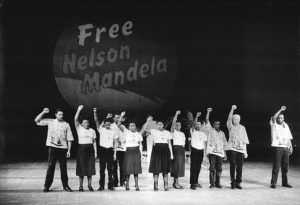In 1948, the National Party (NP) came into power in South Africa and began a campaign of apartheid—the systematic segregation of races. Non-white South Africans were forced to live in different areas from whites and carry passes limiting their movement. They were not even allowed to use the same public facilities as whites. Under the apartheid system, blacks were denied citizenship and could not vote. They were also given fewer rights regarding education, employment, and marriage. In South Africa, the struggle against apartheid was waged by many people for many years. Nelson Mandela was perhaps the most well-known figure in this struggle and is now remembered as an international symbol of peace and freedom.
Becoming an Activist
In 1943, Mandela joined the African National Congress (ANC), a political party that fought against apartheid. A year later, he co-founded the ANC Youth League with Oliver Tambo and Walter Sisulu, which was created to engage young people in the struggle. It advocated for a more aggressive approach to fighting apartheid.
Mandela became one of the ANC’s leaders and helped to organize protests and other forms of resistance against the government’s policies. In 1952, they began a campaign of civil disobedience against the government’s race laws. This campaign included a mass protest in which people of all races burned their passes.
In 1956, Mandela and 155 other people were arrested and charged with treason for their involvement in the campaign. After that, the South African government intensified its repression of the anti-apartheid movement. In response, the ANC decided to engage in armed resistance.
Campaigns and Protests
In 1952, the ANC launched the Defiance Campaign, a mass protest against apartheid laws. Thousands of people across the country participated by refusing to obey racist laws. The campaign successfully got many people to break the law, but it also resulted in Mandela’s arrest and imprisonment.
On March 21, 1960, police opened fire on a group of protestors in the township of Sharpeville, killing 69 people. The incident, known as the Sharpeville Massacre, outraged many people inside and outside South Africa. In response, the ANC called for a nationwide strike and organized a campaign of civil disobedience. The government responded by banning the ANC and jailing many of its leaders, including Mandela. Instead of disbanding, the ANC began working underground and gathered supporters from other countries in its fight against apartheid.
In 1961, Nelson Mandela and other ANC leaders founded Umkhonto weSizwe (MK), also known as the Spear of the Nation. MK was a military organization that used violence to fight against apartheid. Initially, Mandela did not want the MK to be associated with the ANC because he did not want to tarnish the ANC’s reputation with the violence linked to MK’s tactics. Regardless, the MK was still recognized as the more militant offshoot of the ANC.
Under Mandela’s leadership, MK carried out a series of attacks on government buildings and infrastructure. They hoped that by doing this, they would force the government to negotiate with the ANC. In 1963, Nelson Mandela and eight other ANC leaders were arrested and charged with treason. At the Rivonia Trial, Mandela was sentenced to life in prison. He spent the next 27 years in jail, many of them at the notorious Robben Island Prison.
While in prison, Mandela became an international symbol of the struggle against apartheid. His face appeared on posters and T-shirts and was featured in songs and movies. In the 1970s and 1980s, the ANC continued to fight against apartheid through protests, strikes, and acts of civil disobedience. They also engaged in armed resistance.
The End of Apartheid
In 1990, after years of pressure from international sanctions and internal resistance, the South African government under President F.W. de Klerk’s finally agreed to negotiate with the ANC. Nelson Mandela was released from prison after 27 years, and negotiations began in 1991, which led to the repeal of apartheid laws and the holding of free elections.
In 1994, Nelson Mandela was elected president of South Africa in the country’s first free elections. He served a five-year term and then retired from politics. After his retirement, he continued to promote peace and human rights worldwide. During his lifetime, Nelson Mandela fought for the rights of all people, regardless of race. He died on December 5, 2013, at the age of 95. He is remembered as a man who dedicated his life to the cause of freedom and justice.
